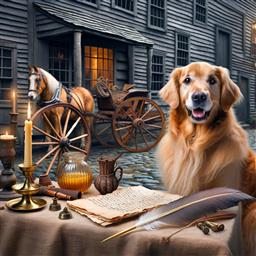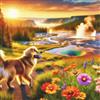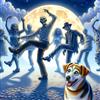1760s Dog Names - Page 5
Updated: June 23, 2024
Welcome to a unique collection of monikers inspired from an era that was a turning point in world history. The 18th century, specifically the 1760s, was a decade of significant change and development. It was a time when the American Revolution was brewing, and the Enlightenment was influencing societies around the globe. This period has a rich cultural and historical significance, and the names from this decade reflect that richness.
Explore our carefully curated list of canine appellations, drawn from popular names of that decade, historical figures, and events that shaped the world. These names, filled with character and charm, are not only unique, but also carry a sense of nostalgia and a link to a bygone era. Whether you're a history buff, a lover of vintage and classic names, or simply looking for a distinctive name for your furry friend, this list encompasses a range of interesting options. Let each name transport you back in time to a world that was evolving and changing, just like your pup will as they grow and develop.
Take a journey back to the 1760s with us, and discover an endearing and distinctive name for your new canine companion that pays homage to this influential decade. We invite you to delve into this collection, and find a name that speaks to your heart and suits your beloved pet perfectly.
| Name | Reason to Choose |
|---|---|
| Trapper | Trapping was a common profession in the 1760s |
| Tudor | Tudor architecture was popular in the 1760s |
| Ulysses | Ulysses was a popular name in the 18th century |
| Union | Political unity was a significant theme |
| Unity | A concept important to the forming of new nations in the 18th century |
| Urchin | Depicts the social conditions of the time |
| Valor | Valor was highly regarded during the 1760s |
| Velvet | Represents the luxurious fabrics of the era |
| Vesper | Vesper was a term for evening prayers in the 1760s |
| Victor | Popular name for winners, often given to dogs |
| Virtue | Moral qualities were highly valued |
| Waltz | Popular dance form of the time |
| Wheat | Farming was a major part of life |
| Whistle | Whistles were used as a form of communication during the 1760s |
| Willow | Named after the tree, popular in folk songs |
| Windsor | The House of Windsor was an influential royal family during the 1760s |
| Xavier | Xavier was a popular name in the 18th century |
| Xenia | Names of Greek origin were common |
| Xerxes | Historical and exotic names were fashionable |
| Yale | Yale University was an established institution during the 1760s |
| Yankee | Represents the American spirit during the era |
| Yarrow | Herbs and medicinal plants were commonly known |
| Yonder | Named for their propensity to wander |
| York | York was a significant city in the 18th century |
| Zeal | Zeal was a valued trait among settlers in the 1760s |
| Zenith | This name represents the pinnacle or highest point, a concept important to the 18th century |
| Zephyr | Nature-based names were popular |
| Zest | Reflects the spirit of the age |
|
Suggest:
|
Submitted!
|
| 1 2 3 4 5 | |
Scientific Names
| Name | Description |
|---|---|
| Archimedes | Named after the renowned Ancient Greek mathematician and scholar, Archimedes |
| Bell | For Alexander Graham Bell, the inventor of the telephone |
| Bohr | For Niels Bohr, the Danish physicist |
| Copernicus | Respects the Polish astronomer, Nicolaus Copernicus |
| Curie | To celebrate Marie Curie, the first woman to win a Nobel Prize |
| Darwin | Named after Charles Darwin, the English naturalist and biologist |
| Descartes | To honor René Descartes, the French philosopher, mathematician, and scientist |
| Edison | A tribute to the American inventor and businessman, Thomas Edison |
| Einstein | Inspired by the genius physicist, Albert Einstein |
| Euclid | A nod to the 'Father of Geometry', Euclid |
| Euler | For Leonhard Euler, the Swiss mathematician |
| Faraday | Inspired by Michael Faraday, the British scientist known for his work in electromagnetism |
| Fermi | A nod to the Italian physicist and creator of the world's first nuclear reactor, Enrico Fermi |
| Galileo | A tribute to the Italian astronomer, physicist, and engineer, Galileo Galilei |
| Gauss | To commemorate Carl Friedrich Gauss, the German mathematician and physicist |
| Hawking | Named after the brilliant theoretical physicist, Stephen Hawking |
| Hubble | To commemorate Edwin Hubble, the American astronomer |
| Kepler | For Johannes Kepler, the German astronomer and mathematician |
| Newton | In honor of Sir Isaac Newton, one of the most influential scientists in history |
| Pascal | Respects the French mathematician, physicist, and philosopher, Blaise Pascal |
| Planck | Inspired by Max Planck, the German theoretical physicist |
| Pythagoras | To celebrate the Greek philosopher and mathematician, Pythagoras |
| Rutherford | In honor of Ernest Rutherford, the physicist from New Zealand |
| Schrodinger | A tribute to the Austrian physicist, Erwin Schrödinger |
| Tesla | In honor of the inventor, electrical engineer, and physicist, Nikola Tesla |
|
Suggest:
|
Submitted!
|
Literary Names
| Name | Description |
|---|---|
| Arouet | Real name of Voltaire, a leading figure in the French Enlightenment |
| Boswell | James Boswell was a Scottish biographer and diarist from the 18th century |
| Burney | Fanny Burney was a popular and influential English novelist |
| Candide | Title of a satirical novella by Voltaire, published in 1759 |
| Clarissa | A character from a popular novel by Samuel Richardson in 1748 |
| Crusoe | From 'Robinson Crusoe,' a well-known novel by Daniel Defoe |
| Defoe | Daniel Defoe, author of 'Robinson Crusoe,' was a significant figure in English literature |
| Diderot | Denis Diderot was a prominent French philosopher and writer during the Enlightenment |
| Fanny | After Fanny Burney, a noted English novelist in the late 18th century |
| Fielding | Henry Fielding was a prominent English novelist known for his humor and satire |
| Goldsmith | After Oliver Goldsmith, a well-known writer and poet from the 18th century |
| Gulliver | From 'Gulliver's Travels,' a famous satirical work by Jonathan Swift |
| Hawthorne | Nathaniel Hawthorne, though just a baby in the 1760s, would later become a significant American novelist |
| Johnson | Samuel Johnson was an important English writer and lexicographer |
| Oliver | Reminiscent of Oliver Goldsmith, an Anglo-Irish writer and poet from the 18th century |
| Pamela | A reference to a novel by Samuel Richardson, published in 1740 |
| Richardson | Samuel Richardson, an influential English writer, penned 'Pamela' in 1740 |
| Rousseau | Jean-Jacques Rousseau, a famous philosopher and writer from the Enlightenment era, penned many influential works |
| Shandy | From the novel 'Tristram Shandy' by Laurence Sterne |
| Smollett | Tobias Smollett was a Scottish poet and author from the 18th century |
| Sterne | Laurence Sterne wrote the novel 'Tristram Shandy' in 1759 |
| Swift | Jonathan Swift was an influential writer known for his satirical works like 'Gulliver's Travels' |
| Tobias | From Tobias Smollett, a noteworthy Scottish author and poet |
| Tristram | The main character of Laurence Sterne's novel 'Tristram Shandy,' first published in 1759 |
| Voltaire | The pen name of François-Marie Arouet, a significant French Enlightenment writer |
|
Suggest:
|
Submitted!
|
Artistic Names
| Name | Description |
|---|---|
| Baroque | Honoring the artistic style that dominated the 17th century |
| Botticelli | After Sandro Botticelli, an Italian painter of the Early Renaissance |
| Caravaggio | Honoring Michelangelo Merisi da Caravaggio, a leading Italian painter |
| Cezanne | After Paul Cézanne, a French artist and Post-Impressionist painter |
| Chagall | Named for Marc Chagall, a Russian-French artist of Belarusian Jewish origin |
| DaVinci | After the renowned Renaissance artist, Leonardo da Vinci |
| Degas | Named in honor of Edgar Degas, a French artist famous for his pastel drawings and oil paintings |
| Donatello | In memory of the Italian sculptor Donatello, from the early Renaissance |
| Durer | This name pays tribute to Albrecht Dürer, a key figure of the Northern Renaissance |
| ElGreco | The nickname of Doménikos Theotokópoulos, a Greek painter, sculptor, and architect of the Spanish Renaissance |
| Gainsborough | After Thomas Gainsborough, a famous English portrait and landscape painter |
| Haydn | In memory of Joseph Haydn, an Austrian composer of the Classical period |
| Manet | After Édouard Manet, a French modernist painter |
| Michelangelo | A homage to Michelangelo di Lodovico Buonarroti Simoni, the famous Italian sculptor, painter, architect, and poet |
| Monet | This name recalls Claude Monet, a founder of French Impressionist painting |
| Picasso | After Pablo Picasso, a Spanish painter, sculptor, printmaker, ceramicist and theatre designer |
| Raphael | Inspired by the Italian painter and architect of the High Renaissance |
| Rembrandt | Named after Rembrandt Harmenszoon van Rijn, a prominent painter of the 17th century |
| Renoir | Inspired by Pierre-Auguste Renoir, a French artist who was a leading painter in the development of the Impressionist style |
| Rococo | Named after the artistic style that originated in France in the 18th century |
| Rubens | Based on the name of Sir Peter Paul Rubens, a prolific Flemish Baroque painter |
| Tintoretto | In honor of Jacopo Comin, known as Tintoretto, a prominent Venetian painter |
| Titian | Inspired by Titian, an Italian painter and one of the most versatile of Italian painters |
| Vermeer | This name recalls Johannes Vermeer, a significant Dutch Baroque period painter |
| Vivaldi | Named for Antonio Vivaldi, an influential Italian composer |
|
Suggest:
|
Submitted!
|
Geographical Names
| Name | Description |
|---|---|
| Albany | Albany, New York, was a colonial city of significance |
| Boston | Named after the city in Massachusetts, which was a key location during the American Revolution in the 1760s |
| Bunker | Bunker Hill, Massachusetts, was the site of a famous battle in the American Revolution |
| Carolina | North and South Carolina were important colonies during the 18th century |
| Charleston | This South Carolina city was a major port during the colonial era |
| Chesapeake | The Chesapeake Bay was a major economic and strategic region in the 1760s |
| Concord | Refers to Concord, Massachusetts, another significant location in the American Revolution |
| Delaware | The Delaware River was a crucial waterway during the 1760s |
| Georgia | Georgia, one of the original 13 colonies, was established in the 18th century |
| Havana | The 1760s saw the British occupation of Havana, Cuba |
| Hudson | Named after the Hudson River, a key waterway in colonial America |
| James | The James River in Virginia was a significant colonial waterway |
| Lexington | The Battle of Lexington was one of the first battles of the American Revolutionary War |
| London | London, England, was the heart of the British Empire during the 1760s |
| Maine | Maine, though not a colony, was a significant region in New England during the 1760s |
| Manhattan | Manhattan was a significant colonial city in the 18th century |
| Orleans | New Orleans was a significant city in the French colonial empire during the 1760s |
| Providence | Providence, Rhode Island was a prominent city in the American Revolution |
| Quebec | The Siege of Quebec was a significant event in the 1760s |
| Rhode | Rhode Island was one of the original 13 colonies |
| Saratoga | The Battle of Saratoga, a turning point in the American Revolution, took place near the end of the 1760s |
| Savannah | The city of Savannah, Georgia, was established in the 18th century |
| Trenton | This refers to Trenton, New Jersey, where a pivotal battle of the American Revolution took place |
| Virginia | One of the original 13 colonies, Virginia had a significant role in the 18th century |
| York | New York was an important city during the colonial era |
|
Suggest:
|
Submitted!
|
Historical Figure Names
| Name | Description |
|---|---|
| Adams | After John Adams, a significant politician and founding father of the United States |
| Arnold | Benedict Arnold, a general during the American Revolutionary War who originally fought for the American Continental Army but defected to the British Army |
| Betsy | A homage to Betsy Ross, believed to have made the first American flag |
| Burgoyne | After General John Burgoyne, British army officer, politician and dramatist |
| Franklin | This name is a homage to Benjamin Franklin, a leading author, printer, and politician in the 1760s |
| Gates | Horatio Gates, a retired British soldier who served as an American general during the Revolutionary War |
| Greene | Named for Nathanael Greene, a major general of the Continental Army in the American Revolutionary War |
| Hale | Named for Nathan Hale, a soldier for the Continental Army during the American Revolutionary War |
| Hamilton | Alexander Hamilton, a founding father and creator of the financial system in America |
| Hancock | Named for John Hancock, a prominent patriot of the American Revolution |
| Henry | Patrick Henry, an American attorney, planter, politician, and orator best known for his declaration to the Second Virginia Convention: 'Give me liberty, or give me death!' |
| Jay | John Jay was a statesman, patriot, diplomat, one of the Founding Fathers of the United States |
| Jefferson | Thomas Jefferson, who drafted the Declaration of Independence, is the inspiration for this name |
| Knox | After Henry Knox, a military officer of the Continental Army and later the United States Army |
| Lafayette | Honoring Marquis de Lafayette, a French aristocrat and military officer who fought in the American Revolutionary War |
| Madison | James Madison, a statesman, lawyer, diplomat, and Founding Father, is the inspiration for this name |
| Monroe | After James Monroe, the last president who was a Founding Father |
| Morgan | A homage to Daniel Morgan, an American pioneer, soldier, and politician |
| Paine | Named after Thomas Paine, a philosopher, writer, and political theorist who greatly influenced the American Revolution |
| Putnam | Named after Israel Putnam, a farmer and soldier who fought with distinction at the Battle of Bunker Hill during the American Revolutionary War |
| Revere | Paul Revere, known for his midnight ride to alert the colonial militia to the approach of British forces |
| Rush | After Benjamin Rush, a Founding Father and a leader in Philadelphia's Yellow Fever epidemic in 1793 |
| Warren | Honoring Joseph Warren, an American physician who played a leading role in American Patriot organizations in Boston |
| Washington | Named after George Washington, who was a prominent figure in the late 1760s |
| Wayne | Anthony Wayne was a United States Army officer and statesman |
|
Suggest:
|
Submitted!
|
User Submitted Images
There are currently no user submitted images for this page. This is your opportunity to be the first! Submit your photo below.
User Recommendations
There are currently no name recommendations for this page. This is your opportunity to be the first! Make your recommendation below.
Recently Updated
We would like to take this time to thank all of our visitors that make DogNamed.com the best dog naming resource on the web. Our site would not be where it is today without your suggestions, ratings, and photo submissions. So pat yourselves on the back for a job well done and keep up the good work! If you have any comments, suggestions, or ideas for the this page or any part of our site, don't hesitate to drop us a line on our Contact Page. Thank you! -The DogNamed Team




























